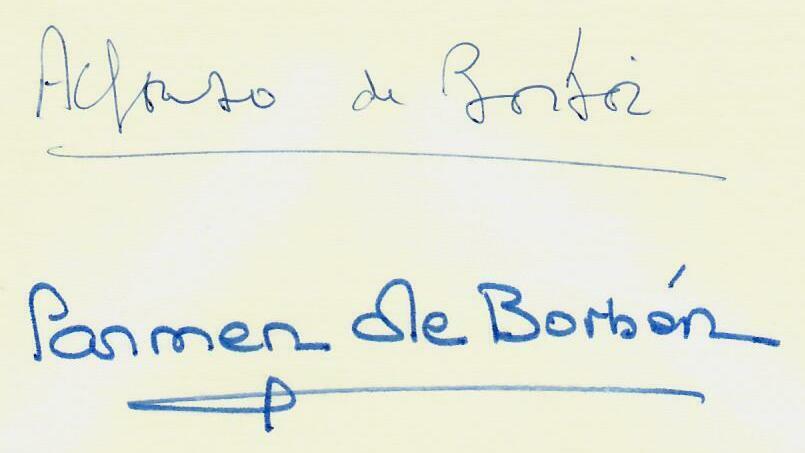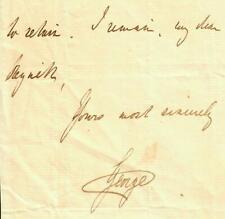When you click on links to various merchants on this site and make a purchase, this can result in this site earning a commission. Affiliate programs and affiliations include, but are not limited to, the eBay Partner Network.
Up for sale a RARE! "Duke And Duchess of Cadiz" Alfonso & Borbon Hand Signed Card. This item is authenticated By Todd
Mueller Autographs and comes with their certificate of authenticity.
ES-3144
Alfonso,
Duke of Anjou, Duke of Cádiz, Grandee of Spain (Alfonso Jaime Marcelino Manuel
Víctor María de Borbón y Dampierre, French citizen as Alphonse de
Bourbon; 20 April 1936 – 30 January 1989) was a grandson of King Alfonso XIII of Spain, a
potential heir to the throne in the event of restoration of the
Spanish monarchy, and a Legitimist claimant to the defunct
throne of France as Alphonse II. lfonso was born at Sant'Anna
Clinic in Rome, the elder son of Infante Jaime, Duke of
Segovia, King Alfonso's second of four sons. His mother was Donna Emanuela de
Dampierre, daughter of Roger, Duke of San Lorenzo and Donna Vittoria Ruspoli dei principi di Poggio Suasa. The Segovias lived in
Rome where Jaime's father had maintained a royal court-in-exile since the royal family fled Spain
following the 1931 election of republicans and socialists in Spain's major
cities. Alfonso was baptised by Cardinal Eugenio Pacelli (later Pope Pius XII) at the Palazzo Ruspoli on
the Via del Corso in
Rome, home of his maternal principi di Poggio Suasa. In 1941
Alfonso and his parents followed his English-born grandmother, Queen Victoria Eugenie to Lausanne in Switzerland. They lived first at the Hotel
Royal, before Alfonso and his younger brother Gonzalo were sent to
the Collège Saint-Jean (later Villa St.
Jean International School) in Fribourg.[4] On 8 December 1946 Alfonso made his first communion with his brother, Gonzalo; on the same
day he was confirmed by Cardinal Pedro Segura y Sáenz, Archbishop
of Seville. The king's eldest son, Alfonso,
Prince of Asturias, had inherited hemophilia from his maternal great-grandmother Queen Victoria, yet had been considered Spain's heir apparent
until the republic was established in 1931. In 1933 he renounced any claim to
inherit the Spanish throne (in the event of a restoration) to marry a
Cuban commoner, Edelmira Sampedro-Ocejo, and later died of internal bleeding
following a minor auto accident by September 1938. Next in the line of
succession, Infante Don Jaime, deaf and largely mute, was previously persuaded
to renounce his claim (and that of future descendants) before his elder
brother, thereby assuming the Duke of Segovia title and clearing the way for
King Alfonso's third son, Don Juan, Count of Barcelona to
take up the monarchist cause on behalf of the banished dynasty. There being no need for Segovia to contract a
dynastic alliance, Emanuela de Dampierre's noble rather than royal background
was looked upon approvingly by the former king and former queen when the couple
wed in Rome in 1935, and neither style nor title is attributed to Alfonso de
Borbón-Segovia y Dampierre in the 1944 edition of the Almanach de Gotha. During the Spanish civil war which began in July 1936 Franco emerged
as the Caudillo of the Falangist movement,
overturning the republic and promising restoration, yet consolidating his grip
on power in Madrid. Following Alfonso XIII's death in Rome in February 1941,
Franco wrote Don Juan, acknowledging him as rightful heir to the throne (though
without inviting him to occupy it), implicitly confirming that he considered
Segovia and his sons excluded from the royal succession. Although in 1947, following the overturn of
monarchies in Eastern Europe and Italy, Franco promulgated, and voters
approved, a succession law which defined Spain as a kingdom, it also empowered
Franco to decide whom to enthrone and when. Don Juan responded by issuing
the Estoril Manifesto which affirmed the traditional order of succession, and
followed up with comments embracing a democratic monarchy. The new law allowed
Franco or his successor to choose any man "of royal lineage" as king,
and Alfonso was mentioned that year as a possible alternative to Don Juan and
his son, Juan Carlos, should Franco consider the former too liberal to reign
over a Falangist Spain.
In December 1949 Segovia retracted his renunciation as coerced and
claimed that he was the rightful claimant to Spain's crown. Relations
between Don Juan and Franco continued to deteriorate and in 1952 the latter
prevailed upon Segovia to send his elder son to Spain to be educated under his
guidance. Reluctantly, Alfonso moved from Switzerland to Spain, initially to
study law at Deusto University and, in 1955 to attend the elite Centro
de Estudios Universitarios (CEU). By 1956 Franco was diverting
sponsors of some civic events from Juan Carlos, who was also being educated in
Spain under the Caudillo's supervision, to Alfonso. By 1964
Franco considered Juan Carlos his preferred candidate for the throne over his
father, but also considered that if the latter deviated from obedience to
Franco or loyalty to his Movimiento Nacional, Alfonso was a
suitable alternative. Alfonso's strongest supporter in Franco's government
was Jose Solis, minister and secretary-general of the Movimiento. Anticipating that Franco would soon offer to
declare him Spain's next king rather than Don Juan, in June 1969 Juan Carlos
warned his father that if he declined Franco's offer, Alfonso would be invited
to accept the crown, nevertheless Don Juan refused to consent to being
bypassed. Nonetheless on 12 July 1969 Franco offered to
designate Juan Carlos king whenever he stepped down from power, and Juan Carlos
accepted. Asked by Juan Carlos to be chief witness at the ceremony
declaring him successor and Prince of Spain, Alfonso immediately
agreed to do so and sent some of his supporters to visit his father in Paris to
persuade him to express no opposition publicly. In return for his full
support, Franco later appointed Alfonso Spain's ambassador to Sweden. But
in June 1972, after he had taken up that post, Alfonso advised Franco's foreign
minister Laureano López Rodó that
he deemed his support conditional upon his cousin's continued loyalty to Francoist Spain. He further hinted that Spain's law of
succession should be amended to facilitate Alfonso's replacing or succeeding
Juan Carlos as Franco's heir or on the throne, if circumstances called for such
a change. On 8 March 1972, in the Palace of El Pardo in Madrid, Alfonso married Doña María del
Carmen Martínez-Bordiú y Franco, daughter of Don Cristóbal Martínez-Bordiú, 10th Marquis de Villaverde, and of
his wife, Doña Carmen Franco y Polo (Franco's
only daughter. Doña Carmen was granted a title in 1975 becoming the 1st Duchess de Franco after Franco's death). The witnesses of
the marriage were Franco and Alfonso's mother. Alfonso and Carmen separated in
1979, received a civil divorce in 1982 and an ecclesiastical annulment in 1986. On 22 November 1972, General Franco
awarded Alfonso the Spanish title Duque de Cádiz with the dignity Grandee of Spain, and he received the style of Royal
Highness. The Cádiz title had been held by the Infante Francisco de Asís. Since
Alfonso's mother was not born a princess of royal descent, his grandfather
Alfonso XIII did not consider young Alfonso in line to the Spanish throne in
accordance with the Pragmatic Sanction of 1830.
Alfonso's father Jaime, however, came to assert that his sons were French dynasts entitled to the style of Royal Highness.
In Spain up until 1972 Alfonso was generally addressed as Don Alfonso
de Borbón y Dampierre. Elsewhere he was often addressed as a prince. From
his birth Alfonso was considered a prince du sang by those legitimists who believed that
Alfonso XIII was also the heir to the French throne. When his grandfather died
on 28 February 1941, Alfonso's father Jaime succeeded him in this French claim;
Alfonso was thereupon recognised by the legitimists as Dauphin of France. On 25 November 1950, Alfonso received the
title Duc de Bourbon (Duke of Bourbon) from his father. In 1963 Alfonso engaged
the French historian and ardent royalist Hervé Pinoteau as his private secretary. Pinoteau
remained with him until the duke's death. On 20 March 1975,
Alfonso's father Jaime died; he was immediately recognised by his supporters as
King Alphonse II of France. On 3 August 1975, he took the courtesy title Duc
d'Anjou (Duke of Anjou).
View more great items









